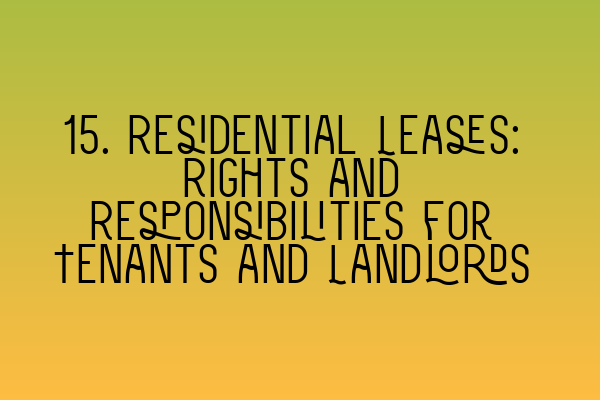[Title: 15. Residential Leases: Rights and Responsibilities for Tenants and Landlords]
Introduction:
When it comes to renting a residential property, both tenants and landlords have certain rights and responsibilities that they need to be aware of. Understanding these rights and responsibilities is essential for a smooth and harmonious tenancy. In this blog post, we will discuss 15 key aspects of residential leases that every tenant and landlord should know. Whether you are a tenant looking for a new place to live or a landlord wanting to lease out your property, this post will provide you with valuable insights. So, let’s dive in!
1. Understanding the Lease Agreement:
The lease agreement is the foundation of the landlord-tenant relationship. It outlines the terms and conditions of the tenancy, including the rent amount, duration, and any other rules or obligations. As a tenant, carefully review the lease agreement before signing it, and as a landlord, ensure the agreement is legally sound and comprehensive.
2. Rent Payment:
One of the primary responsibilities of a tenant is timely rent payment. Paying rent on time is crucial to maintaining a good relationship with your landlord. Tenants should also be aware of any applicable rent increases and how and when they should be notified.
3. Maintenance and Repairs:
Landlords are generally responsible for maintaining the property in a habitable condition. This includes ensuring that essential facilities, such as plumbing and heating, are in proper working order. Tenants should promptly notify their landlord of any necessary repairs or maintenance issues.
4. Security Deposits:
Landlords often require tenants to pay a security deposit at the beginning of the tenancy. The purpose of a security deposit is to cover any damages beyond normal wear and tear or unpaid rent. Tenants should understand the conditions under which the security deposit may be withheld or deducted upon lease termination.
5. Privacy and Access:
Tenants have the right to enjoy their rented property without unnecessary intrusion from the landlord. Landlords should provide reasonable notice before entering the property unless it is an emergency or if the tenancy agreement specifies otherwise.
6. Quiet Enjoyment:
Both tenants and landlords have a responsibility to ensure that the tenant can peacefully enjoy the property without interference. Landlords should take action if other tenants or neighbors are causing disturbances.
7. Property Insurance:
While landlords are typically responsible for property insurance, tenants should consider obtaining renter’s insurance to protect their personal belongings within the rented property.
8. Lease Renewal and Termination:
Understanding the terms for lease renewal or termination is crucial for both tenants and landlords. Tenants should be aware of the notice period required for terminating the lease, and landlords should clearly communicate their intentions regarding lease renewal.
9. Subletting and Roommates:
Tenants may wish to sublet their rented property or have roommates to share the rent. However, it is essential to review the lease agreement to understand the specific terms related to subletting and adding roommates.
10. Pets:
Many landlords have specific rules regarding pets. Tenants should be aware of any pet policies stated in the lease agreement and seek permission from the landlord if necessary.
11. Alterations and Improvements:
Tenants should obtain written consent from the landlord before making any alterations or improvements to the rented property. Landlords, on the other hand, should respond to tenant requests for alterations in a reasonable and timely manner.
12. Eviction:
While eviction is typically a last resort, landlords may need to evict tenants for specific reasons, such as non-payment of rent or breach of lease terms. Tenants should be aware of their rights and the eviction process according to the law.
13. Dispute Resolution:
In case of any conflicts or disagreements, tenants and landlords should endeavor to resolve the issue through open communication. If necessary, seek professional advice or consider alternative dispute resolution methods, such as mediation.
14. Property Inspections:
Landlords may conduct routine property inspections to ensure that tenants are maintaining the property properly. Proper notice and adherence to privacy rights are crucial during these inspections.
15. Legal Assistance:
Lastly, both tenants and landlords should seek legal assistance when necessary. If you encounter complex legal issues or need guidance with lease agreements, it’s best to consult a property law solicitor who can provide expert advice and ensure that your rights are protected.
Conclusion:
Residential leases involve a range of rights and responsibilities for both tenants and landlords. By understanding and fulfilling these obligations, both parties can enjoy a harmonious tenancy. Whether you are a tenant or a landlord, both the law and ethical considerations require you to act responsibly and be aware of the rights and responsibilities outlined in your lease agreement. If you have any further questions or require legal advice, don’t hesitate to reach out to SQE Property Law & Land Law solicitors who specialize in property law matters.
Related Articles:
– [SQE 1 Practice Exam Questions](https://fqps.co.uk/sqe/sqe1-preparation/mcq-practice-quiz)
– [SQE 1 Practice Mocks FLK1 FLK2](https://fqps.co.uk/sqe/sqe1-preparation/practice-mocks-quiz)
– [SQE 2 Preparation Courses](https://fqps.co.uk/sqe/sqe2-preparation)
– [SQE 1 Preparation Courses](https://fqps.co.uk/sqe/sqe1-preparation)
– [SRA SQE Exam Dates](https://fqps.co.uk/sqe/sqe1-sqe2-exam-dates)
